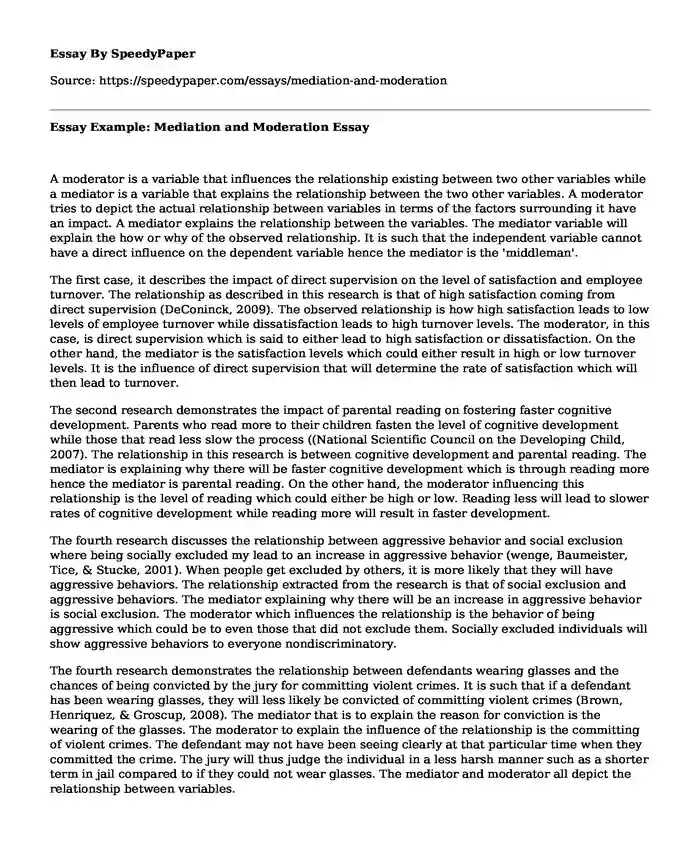
| Type of paper: | Essay |
| Categories: | Social psychology Human behavior Interpersonal communication |
| Pages: | 3 |
| Wordcount: | 661 words |
A moderator is a variable that influences the relationship existing between two other variables while a mediator is a variable that explains the relationship between the two other variables. A moderator tries to depict the actual relationship between variables in terms of the factors surrounding it have an impact. A mediator explains the relationship between the variables. The mediator variable will explain the how or why of the observed relationship. It is such that the independent variable cannot have a direct influence on the dependent variable hence the mediator is the 'middleman'.
The first case, it describes the impact of direct supervision on the level of satisfaction and employee turnover. The relationship as described in this research is that of high satisfaction coming from direct supervision (DeConinck, 2009). The observed relationship is how high satisfaction leads to low levels of employee turnover while dissatisfaction leads to high turnover levels. The moderator, in this case, is direct supervision which is said to either lead to high satisfaction or dissatisfaction. On the other hand, the mediator is the satisfaction levels which could either result in high or low turnover levels. It is the influence of direct supervision that will determine the rate of satisfaction which will then lead to turnover.
The second research demonstrates the impact of parental reading on fostering faster cognitive development. Parents who read more to their children fasten the level of cognitive development while those that read less slow the process ((National Scientific Council on the Developing Child, 2007). The relationship in this research is between cognitive development and parental reading. The mediator is explaining why there will be faster cognitive development which is through reading more hence the mediator is parental reading. On the other hand, the moderator influencing this relationship is the level of reading which could either be high or low. Reading less will lead to slower rates of cognitive development while reading more will result in faster development.
The fourth research discusses the relationship between aggressive behavior and social exclusion where being socially excluded my lead to an increase in aggressive behavior (wenge, Baumeister, Tice, & Stucke, 2001). When people get excluded by others, it is more likely that they will have aggressive behaviors. The relationship extracted from the research is that of social exclusion and aggressive behaviors. The mediator explaining why there will be an increase in aggressive behavior is social exclusion. The moderator which influences the relationship is the behavior of being aggressive which could be to even those that did not exclude them. Socially excluded individuals will show aggressive behaviors to everyone nondiscriminatory.
The fourth research demonstrates the relationship between defendants wearing glasses and the chances of being convicted by the jury for committing violent crimes. It is such that if a defendant has been wearing glasses, they will less likely be convicted of committing violent crimes (Brown, Henriquez, & Groscup, 2008). The mediator that is to explain the reason for conviction is the wearing of the glasses. The moderator to explain the influence of the relationship is the committing of violent crimes. The defendant may not have been seeing clearly at that particular time when they committed the crime. The jury will thus judge the individual in a less harsh manner such as a shorter term in jail compared to if they could not wear glasses. The mediator and moderator all depict the relationship between variables.
References
Brown, M. J., Henriquez, E., & Groscup, J. (2008). The effects of eyeglasses and race on juror decisions involving a violent crime. American Journal of Forensic Psychology.
DeConinck, J. B. (2009). The effect of leader-member exchange on turnover among retail buyers. Journal of Business Research, 62(11), 1081-1086.National Scientific Council on the Developing Child (2007). Using evidence to improve outcomes in learning. National Scientific Council on the Developing Child.
Twenge, J. M., Baumeister, R. F., Tice, D. M., & Stucke, T. S. (2001). If you can't join them, beat them: Effects of social exclusion on aggressive behavior. Journal of Personality and social psychology, 81(6), 1058.
Cite this page
Essay Example: Mediation and Moderation. (2023, Jan 16). Retrieved from https://speedypaper.net/essays/mediation-and-moderation
Request Removal
If you are the original author of this essay and no longer wish to have it published on the SpeedyPaper website, please click below to request its removal:
- Euthanasia Essay Sample - The Helen Scott's Case
- EFL/ESL Book Analysis for Beginners, Essay Sample
- Personal Statement Essay Example: Master of Science in Computer Science
- Free Essay Describing the Product Concept in Marketing
- Free Essay on How Physics Is Related to Our Real Life
- Essay Example on the Snowball Earth Program
- Samsung Brand Identity - Free Essay Sample
Popular categories




